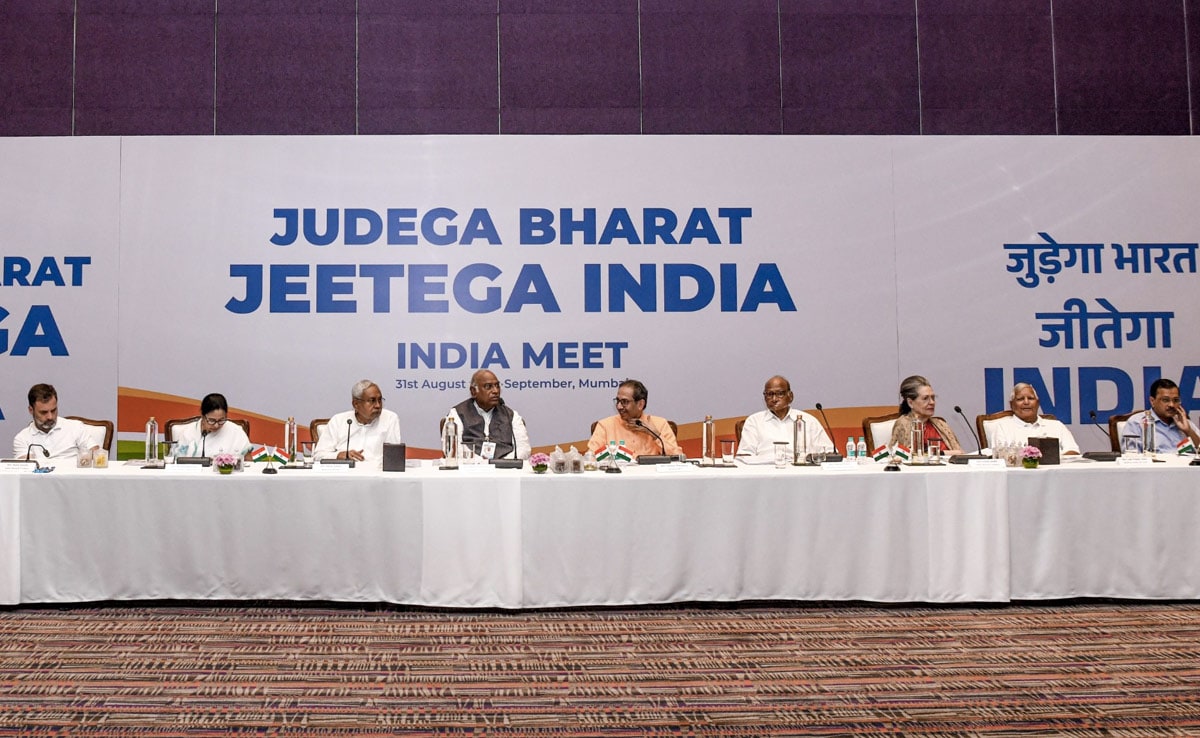
The INDIA opposition alliance consists of 28 national and regional parties (File).
New Delhi:
The INDIA alliance is working on seat-sharing agreements and a final decision is likely by the end of the month, sources told NDTV Friday as the clock ticks down to one of the most crucial elections in the country’s history.
Here are the top 10 points in this big story:
-
Talks will possibly begin in states where regional parties are major partners, such as Bihar, Bengal, Maharashtra and Tamil Nadu. An agreement in the first two is likely to be hard-fought given the strength of the parties involved. Deals in the latter two may be easier, although in Maharashtra deciding which seats the Congress, the Shiv Sena UBT and the NCP will contest may be a problem.
-
Bihar’s 40 seats have to be split between the Congress, the Janata Dal (United) and the Rashtriya Janata Dal. In 2019 the JDU – then with the Bharatiya Janata Party – won 16 of the 17 seats it contested and that puts Chief Minister Nitish Kumar in a strong position. The RJD won zero but it is unlikely to be cut out since it is the largest party in the Assembly. The JDU can’t rule sans its support.
-
Sources have said the JDU and the RJD, whose leader Tejashwi Yadav is Deputy Chief Minister, want to contest an equal number of seats and divide the rest among the Congress (which won just one seat) and smaller outfits. Understandably then, finding an agreement here will take time. In fact, the Congress’ Bihar chief, Akhilesh Prasad Singh, has said talks haven’t officially begun.
-
Over in Maharashtra – which sends 48 MPs to the Lok Sabha – an agreement on division of seats may be easier to come by. There are three INDIA allies here – the Congress, the Nationalist Congress Party and ex-Chief Minister Uddhav Thackeray’s Shiv Sena faction. Sources have said there is an agreement-in-principle to divide seats equally – 16 each – among the Maha Vikas Aghadi allies. There is also consensus that the three will give seats to smaller partners from their own quota.
-
The difficulty, though, is allocating seats to allies. An example – the Mumbai (South Central) seat is held by Rahul Shewale, a Shiv Sena leader who is now with Eknath Shinde’s camp. The Thackeray faction wants to contest this seat again but so too does the Congress. The Congress also has its eyes on the Mumbai (South) seat held by Arvind Sawant, who is still with the Thackeray Sena camp.
-
There is not likely to be any problem in Tamil Nadu, where the Dravida Munnetra Kazhagam and the Congress have all but settled on a deal. The two contested the 2019 election together too and, as it was then, the DMK will get 20 seats and the Congress nine, with the remaining distributed to other coalition partners.
-
And then there is Bengal and the frosty relations between the ruling Trinamool, the Congress, and the CPIM-led Left Front. Chief Minister Mamata Banerjee is in Spain and discussions over the state’s 42 seats will begin on her return. Sources said she may play nice with the Congress but a deal with the CPIM will be harder.
-
The task may be harder after INDIA announced plans to push for a caste census – something Ms Banerjee opposed. The committee made the announcement on Wednesday – at a meeting the Trinamool’s Abhishek Banerjee was unable to attend because of a “convenient” summons by the Enforcement Directorate
-
Sources have also indicated deals are near for Jammu and Kashmir’s five seats – between the Congress, the National Conference and the People’s Democratic Party. The Congress and the Aam Aadmi Party must work out deals for Delhi’s seven and Punjab’s 13 seats and the two are also expected to divide Gujarat’s 26 seats.
-
Across the country there are also 100 others seats in which the Congress is expected to go head-to-head with the BJP. There will, therefore, be no seat-sharing for these, sources told NDTV.




